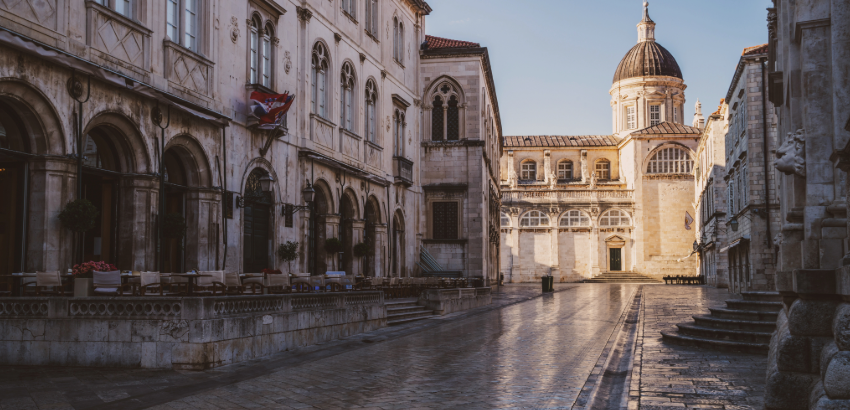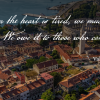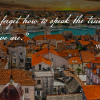
Published: February 28, 1998
View the OriginalNewsletter: Cirkular-6A.pdf
About This Issue
This expanded edition of Cirkular follows the momentum of February 1998 — a time of awakening for Croatians at home and abroad. It documents the formation of the Committee for the Renewal of Vukovar, celebrates national and community achievements, and highlights the ongoing mission of remembrance, unity, and rebuilding. At its core, this issue carries Valentina Krčmar’s unmistakable voice: passionate, proud, and deeply human.
A Cry for Vukovar
The issue opens with Valentina Krčmar’s stirring editorial about her visit to Vukovar in October 1997. She recalls walking through the city’s ruins, camera in hand, capturing devastation that “was more than stone and dust — it was the echo of human cries.”
She urges the Croatian community in Toronto to act — not just pray:
“VUKOVAR NEEDS MORE THAN PRAYER. It’s time to put your money where your heart is.”
Krčmar calls for a united effort among parishes, associations, and individuals to fund the restoration of one of the city’s 18 most vital public buildings. She envisions this humanitarian action as sacred work — a mission of gratitude toward those who gave their lives.
Her words are personal and resolute:
“How could we ever meet Siniša’s eyes if we did not give everything we could — and more — for his Vukovar?”
Founding of the Committee for the Renewal of Vukovar
The next section reports on the founding meeting of the Committee, held on February 12, 1998 at the Croatia Banquet Hall in Toronto. The event drew over a hundred representatives from Croatian organizations across the region.
Croatian Consul Ivan Pićukarić delivered a deeply moving address, quoting journalist Siniša Glavašević’s final broadcast from Radio Vukovar:
“Who will guard my city? Who will carry Vukovar out of the darkness?”
Pićukarić described the staggering human and material losses of the war — over 2,700 killed, 8,400 wounded, and nearly 100,000 displaced in Croatia’s Danube region alone. Yet, his message was one of hope and responsibility:
“We defended Croatia alone — and now we must rebuild it alone.”
The assembly unanimously elected Zvonko Luburić as President of the Committee and approved a new Executive Board to lead the campaign.
Naming the Organization After Siniša Glavašević
Krčmar follows the report with an impassioned appeal to name the new organization after Siniša Glavašević, the journalist who gave his life in Vukovar.
“A name like Siniša’s would mean more than just a title — it would give the cause a soul.”
She envisions the “Siniša Glavašević Foundation” as both a humanitarian and symbolic gesture — a reminder that the freedom of Croatia was written in the courage of ordinary citizens.
Toronto and the Croatian-Canadian Community
Beyond Vukovar, Cirkular No. 6A showcases the vitality of the Croatian community in Toronto and Mississauga:
-
The Canadian-Croatian Congress announces its annual general meeting for March 29, 1998, to elect new representatives and discuss expanding Croatian language programs at York University and McMaster University.
-
Croatian Community Services continues to provide free computer training, employment support, and financial aid for adult learners.
-
Toronto’s Archbishop Alojzije Ambrozic is elevated to Cardinal — a source of great pride among local Croatians.
-
The Lika Society announces its charity banquet for March 14, with proceeds going to children of fallen soldiers.
-
The Karlovac Society “St. Joseph” prepares its annual celebration for March 21, dedicated to Croatia’s patron saint.
Krčmar’s editorial voice emphasizes how these local actions — dinners, lectures, and fundraisers — are threads in a larger fabric of national renewal.
Cultural Revival and Croatian Pride
Poetry and Literature
Cirkular continues its cultural mission by highlighting the posthumous poetry collection “Bez nas” (Without Us) by Željko Sabol, edited by Milan Mirić.
Krčmar describes Sabol as a visionary poet whose work foresaw the suffering that would engulf Croatia. His death in 1991, during the height of the war, is framed as both a personal tragedy and a national symbol.
“There are too many poems to name them all, but each one carries the same heartbeat — Croatia’s soul, bleeding yet unbroken.”
“Od stoljeća sedmog” – A Song of Endurance
The patriotic poem “Od stoljeća sedmog” (“Since the Seventh Century”) reappears in this issue, a lyrical celebration of Croatia’s timeless survival:
“This is our land — here live the Croats.
What is written on stone cannot be erased.”
Life, Faith, and Lessons
Everyday Wisdom
Regular columns return with practical and humorous advice:
-
“Rules for Good Manners” — a charming dialect column reminding readers not to slurp soup or shout in company.
-
“Did You Know?” — household and hygiene tips from Radojka Semrov, including:
-
Wash hands upon returning home.
-
Never put money in your mouth.
-
Don’t clap after national anthems.
-
Health and Nutrition
Dr. Darko Desatyi continues his series on health education with an article on dietary fiber, explaining its role in digestion, heart health, and blood sugar control. He notes:
“Fiber doesn’t provide vitamins or minerals, but it cleanses the body — just as good deeds cleanse the soul.”
The Voice of Truth: Letters to the Press
Cirkular republishes a letter written to Saturday Night Magazine responding to Patrick Graham’s article “Canadian Warlord”, which criticized Croatia’s wartime leadership.
The letter, penned by members of the Canadian-Croatian Congress, defends Croatia’s struggle for independence and corrects historical inaccuracies:
“Croatia’s war was not one of conquest, but of survival. Its people fought not for domination, but for freedom.”
It serves as both a rebuttal and an assertion of Croatian dignity in the face of misrepresentation.
Reflections on the Community
In her final column, Valentina Krčmar turns her attention inward — to the Croatian community in Toronto. She expresses disappointment that Croatian-owned restaurants and businesses receive little support from fellow Croats, despite being among the first to help during crises.
Her message is sharp yet hopeful:
“Why do we forget our own until we need them? If we want our community to thrive, we must believe in each other again.”
She warns of division within the diaspora — a “fifth column” that sows mistrust — and urges Croatians to unite in purpose and pride.
Her closing line is classic Valentina:
“God put me on this earth to accomplish a certain number of things. Right now, I am far behind. I will never die!”
In Summary
Cirkular No. 6A is both a continuation and culmination — a companion issue to No. 6 that reinforces the same mission: to rebuild Vukovar, preserve faith, and strengthen unity.
Through speeches, poetry, humor, and heartfelt appeals, it captures the pulse of a community that refuses to forget where it came from or who it’s meant to be.




